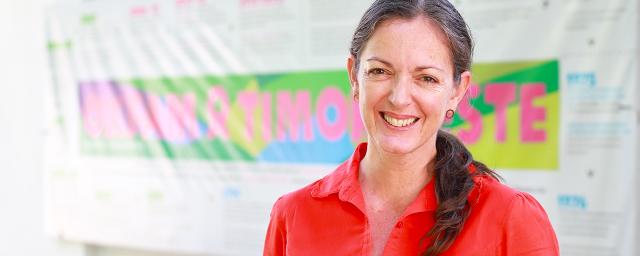
“We see relationships with communities as Oxfam and partners walking together and not devaluing or prioritizing one relationship over another.” - Kathy Richards, Oxfam’s Country Director in Timor-Leste
“Oxfam in Timor-Leste staff have shown courage in challenging deeply held views and creating spaces for colleagues to feel comfortable to share new ideas.”
My name is Kathy Richards. I’m Oxfam’s Country Director in Timor-Leste. We have embarked on a journey to embed high-quality safeguarding in our programs. For many of our partners, this is a new area, and understanding on safeguarding issues varies from partner to partner. We selected child safeguarding as our initial entry point: we felt this would help us to introduce safeguarding issues, build trust on these sensitive issues and establish a platform for future dialogue.
In order to promote safe and robust reporting we produced a poster using as little writing as possible. We used icons to represent the five key issues that we wanted to get across, including someone in a wheelchair representing people with disabilities and a male icon holding a child’s hand, as a subtle way to challenge gender norms. The poster ends with the message: If a child faces any safeguarding risk, please contact Oxfam’s Safeguarding Focal Point.

We worked together with a local training organization who helped socialize the poster with partners. Their feedback was positive – people said they found it easy-to-understand – “you can circulate it, talk to people about it, and it will stand alone to remind people of the standards that we set”. We’re now moving to broader safeguarding messages, such as what “zero tolerance” of sexual exploitation means in practice.
We’ve had lively debates about what extent good safeguarding practice should be socialized by Oxfam directly, or done so through our partners. I think it’s a mix of both. We have to be sensitive in Timor-Leste to the very real issues about the agency of those working within the communities. People in Timor-Leste have experienced decades of trauma during the Indonesia occupation. If people are going to use our new feedback mechanisms, we need to build trust. We see relationships with communities as Oxfam and partners walking together and not devaluing or prioritizing one relationship over another.
Transforming Oxfam’s culture through leadership and Feminist Principles
In order to tackle deep-rooted behaviors and bring feminist principles in our work, my approach is to be accessible. Oxfam in Timor-Leste has 46 staff and three volunteers in three locations. Only two staff are international and we have a Tetum-speaking workplace. My team is predominantly male (80%) and in some work areas, 100% of staff are men. At a formal level there is good understanding of the imperative to change. However, this needs to translate into everyday practice, and when it comes to challenging social norms, there is still a lot of work to do.
We recently completed a gender assessment of the Oxfam in Timor-Leste Country Program. We used anonymous interviews and surveys to dig down into attitudes, opinions and perspectives on gender. We found some deep-rooted views on gender roles! For example, when asked to indicate whether different roles in Oxfam were more appropriate for a man or a woman to perform – female staff said the role of a Country Director could be carried out by any gender, whereas male staff said it was a role more appropriate for men.
It’s important we bring these views out and discuss why people feel this way – and challenge, in a safe space, those assumptions about women and men’s roles. By working together, views on gender are shifting. I have noticed more awareness if a female colleague is not given space to talk in a meeting, and questions are now being asked on what is the gender impact of a program activity.
Oxfam in Timor-Leste staff have shown courage in challenging deeply held views and creating spaces for colleagues to feel comfortable to share new ideas. I can see people are creating new reference points from which they can start conversations about partnership, power, and the principles we want to work by. It’s a critical journey we are on together.